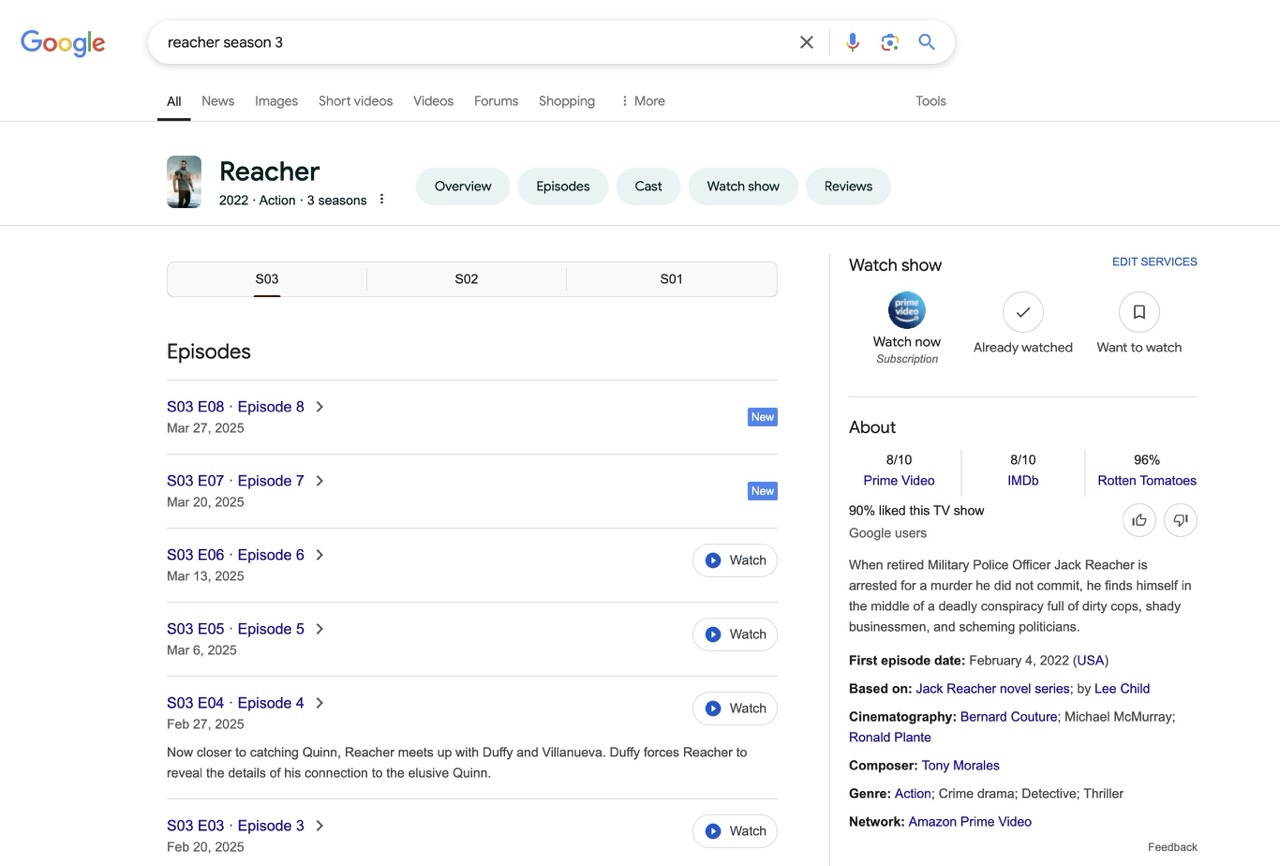Will AI Kill SEO? How Agencies Can Future-Proof Their Strategy
AI is changing how search engines rank content and how people search for information. Will SEO survive?
If I want to know when the next episode of Reacher Season 3 will drop, I go straight to Google, type in “reacher season 3,” and instantly scan the knowledge panel search results. No clicks needed—I get my answer in seconds.
If I am trying to find information on a brand, a movie, a band, or even a specific song, I do the same. Short-tail keywords, quick lookup. And if I am looking for a café, a resort, or a restaurant nearby, I go to Google Maps.
But when my queries go deeper—like a nutritional breakdown of celery, a comparison of Mao Zedong’s and Joseph Stalin’s death tolls, or a comprehensive analysis of Prodigy’s competitors in the UK B2B marketing space—I no longer turn to Google.
I go to ChatGPT or Perplexity AI for instant AI-generated summaries. And I’m not alone. Millions of people are doing the same—relying on AI for research instead of traditional search engines.
That shift—from simple, quick searches to AI-driven deep research—is happening across the board. And it’s shaking up SEO.
So, the questions on many agency owners’ minds are: will AI kill SEO? Will Google penalise AI-generated content? Is search traffic doomed for my agency?
The short answer? No, SEO is not dead. But it is evolving. Fast.
AI is changing how people search, how Google ranks content, and how agencies should approach SEO strategy. Google’s AI-powered search results (like AI Overviews) reduce organic click-through rates by providing instant answers, while AI-generated content is flooding search results with mass-produced articles.
But despite these shifts, SEO is still one of the most powerful and profitable marketing channels—if you understand where it’s headed.
In this article, we will break down whether AI-generated content is helping or hurting SEO, how agencies can future-proof their strategies, and why human-written content still wins (and how to use AI without compromising rankings).
Is AI-Generated Content Hurting or Helping SEO?
AI-generated content is everywhere. From automated blog posts to AI-written product descriptions, businesses are using tools like ChatGPT, Jasper, and Gemini to scale content production at an unprecedented rate. But with so much AI-generated material flooding search results, the big question is: Is this helping or hurting SEO?
It depends.
When used strategically, AI can save writers a lot of time, increase the quality of content, and enhance overall SEO efforts. But when misused—without human oversight, originality, or strategic intent—it can damage rankings and credibility.
What We Know About Google’s Stance on AI Content
The first thing to address is Google’s official position on AI-generated content. Despite the fear-mongering about “AI penalties,” Google has repeatedly stated that it does not outright penalise AI-generated content. Instead, it evaluates content based on helpfulness, originality, and E-E-A-T (Experience, Expertise, Authoritativeness, Trustworthiness).
According to Google’s Search Central Blog:
“Using AI doesn’t automatically make content spam. What matters is the quality of the content—not how it was produced.”
That means AI-generated content is not inherently bad for SEO. But, low-quality, mass-produced AI content that lacks originality or provides generic information will struggle to rank.
AI Content vs. Human-Written Content
Recent studies show that AI-generated content can rank well—but only when it meets high editorial standards.
Neil Patel’s research found that human-written content consistently outperformed AI content in terms of traffic and engagement. His study showed that AI-generated content drove traffic inconsistently, while human-written articles experienced steady growth.
Google’s Helpful Content Update (HCU) aims to prioritise content that demonstrates experience and expertise—something AI struggles with.
Zero-click searches are rising. With Google’s AI Overviews providing instant answers, many users no longer need to click through to a website. This means generic AI-written content is more likely to be ignored.
All of these mean that…
Over-reliance on AI can hurt rankings. Mass-produced AI articles tend to be repetitive, lack originality, and fail to provide fresh insights, which can lead to lower engagement and trust.
AI content can trigger Google’s spam filters if it lacks depth, is keyword-stuffed, or is used to churn out thin, low-quality pages at scale.
In short, AI can be an asset or a liability, depending on how you use it.
When AI Helps SEO
AI is a powerful tool for optimising and scaling content efforts—when used strategically.
Keyword Research and Topic Ideation: AI tools like ChatGPT and Perplexity can analyse vast datasets to identify trending keywords, search intent patterns, and content gaps—helping agencies plan more targeted content. This is how I mainly use AI in my writing.
Content Structuring and Outlining: AI can generate content outlines based on top-ranking pages, helping agencies create highly optimised content faster.
Personalisation and User Intent Matching: AI-powered SEO tools can analyse user behaviour and provide hyper-personalised content recommendations, improving dwell time and engagement.
Multilingual SEO: AI translation tools allow businesses to expand their reach internationally, optimising content for multiple markets more efficiently than traditional methods.
When AI Hurts SEO
AI-generated content is problematic when it prioritises volume over value:
Low-Quality, Thin Content: AI-written articles often lack the depth, nuance, and expertise needed to rank well in competitive industries. Google can detect shallow content, leading to lower rankings.
No Unique Perspective: AI can only remix existing information—it cannot generate truly original ideas, firsthand experience, or human insights.
Keyword-Stuffing and Over-Optimisation: AI can be prone to keyword stuffing if not properly edited, which hurts SEO rather than helping it.
Duplicate Content Risks: Because AI pulls from existing sources, it can inadvertently create near-duplicate content, triggering Google’s duplicate content filters.
The Verdict: AI + Human = The Winning Formula
So, is AI-generated content helping or hurting SEO? The best answer is that AI should assist—not replace—human writers.
Google values originality, trust, and experience. If AI is used to enhance human-created content rather than mass-producing articles, it can be a powerful tool for improving SEO efforts.
The key takeaway for agencies like us? AI should be part of your SEO strategy—but not the whole strategy. Personally, I view it as a force multiplier, combining AI’s efficiency with our copywriters’ insights and creativity to create compelling content.
How Agencies Can Future-Proof Their SEO Strategies
Since AI is here to stay, here’s how agencies can future-proof their SEO strategies.
Adopt a “Human + AI” Content Model
AI is great for efficiency. Humans are great for originality. The agencies that win will be those that blend the two.
At Prodigy, here’s how we do it:
AI for Research, Ideation, and Drafting: Use AI tools like Perplexity (my personal favourite), ChatGPT, or Claude to generate content ideas, outline structures, and organise data. AI can surface valuable insights way faster than manual research alone.
Human Oversight for Strategy, Creativity, and Final Edits: AI can’t generate original thought leadership or personal expertise. Writers and strategists should refine AI-generated drafts, adding experience, voice, and nuance. Here, I love using ChatGPT’s dictation mode. I narrate my thoughts, point of view, and personal experiences, the AI cleans it up and integrates it into the draft, then I do the final edits.
Editorial Standards Still Matter: Google rewards depth, accuracy, and E-E-A-T (Experience, Expertise, Authoritativeness, Trustworthiness). AI alone can’t meet those standards. Every piece of content should undergo a human fact-check and refinement process before publication.
Prioritise First-Party Data and Audience Insights
Google’s AI Overviews are reducing organic clicks. More people get their answers without ever visiting your website.
Agencies must build direct relationships with their audience to reduce reliance on Google.
Leverage First-Party Data: Build an email list. Nurture leads through newsletters. Capture data directly from your audience to reduce dependence on search engines.
Understand Search Intent, Not Just Keywords: AI-driven algorithms prioritise user behaviour over static keyword matching. Agencies need to focus on creating intent-driven content that directly addresses audience needs.
Optimise for Personalised Search: Google tailors results based on individual users’ behaviour, search history, and location. Content must be adaptable to different search contexts.
Shift from “Content at Scale” to “Content That Matters”
SEO has long been a volume game: more content, more traffic, more rankings.
But with Google prioritising usefulness over quantity, the era of mass-producing thin, AI-generated content is over.
Instead, agencies should focus on:
Authority-Driven Content: Case studies, expert interviews, research-backed insights—anything that showcases deep expertise.
Long-Form, Comprehensive Pieces: Google still rewards depth. Detailed guides, ultimate resource lists (a personal favourite), and in-depth industry analysis outperform surface-level content.
Multi-Format Repurposing: A single well-researched article can be repackaged into videos, LinkedIn posts, email sequences, and podcast episodes—ensuring broader reach and engagement. This one is incredibly powerful.
Optimise for AI-Generated Search Experiences
Google’s AI-powered search (like AI Overviews) is fundamentally changing how people find and consume information. Agencies must adapt.
Target Featured Snippets and AI Summaries: AI-generated search results pull data from trusted sources. Structure content using clear headings, bullet points, and concise answers to increase visibility (much like this article).
Write for Conversational Search and Voice Queries: With the rise of AI-powered voice assistants, more searches are phrased as natural questions. Optimising for question-based keywords will improve rankings in AI-driven results.
Diversify SEO Beyond Google: More people are searching on Reddit, TikTok, LinkedIn, and niche industry forums. Agencies should optimise content across multiple search ecosystems to avoid total reliance on Google.
Actionable Tip: Reformat website content for AI-driven search—use FAQ sections, structured data markup, and direct, concise answers to common queries.
Focus on Brand Authority and Thought Leadership
AI can generate words—but it can’t build a trusted brand.
For agencies, brand reputation will become the ultimate SEO strategy.
Invest in Original Research and Proprietary Data: Conduct industry surveys, publish exclusive reports, and provide data-backed insights that AI-generated content can’t replicate.
Leverage Personal Branding: Founders and agency leaders should be actively publishing content on LinkedIn, guest posting on industry sites, and speaking at events to establish domain expertise. I know this is incredibly hard for a busy agency principal (I’m there), but it’s the most impactful marketing activity we can do.
Foster a Community, Not Just an Audience: SEO should be paired with engaged communities—on LinkedIn, Slack, or private email lists. A loyal audience reduces dependence on Google rankings.
Actionable Tip: Prioritise trust signals—high-quality backlinks, media mentions, client case studies, and user engagement signals—all of which Google values in ranking algorithms.
If you have been in the industry long enough, you have heard it before: SEO is dead. People said it when Google cracked down on keyword stuffing. They said it when social media took off. They said it when voice search became a thing. And now, with AI-generated content flooding the internet, they are saying it again.
But here is the truth: SEO is not dead. Lazy SEO is.
The agencies that win will be the ones that focus on depth over volume, originality over automation, and brand authority over quick wins. The ones that create content worth reading, sharing, and trusting.
Agencies that focus on real value will always win. AI or not.





